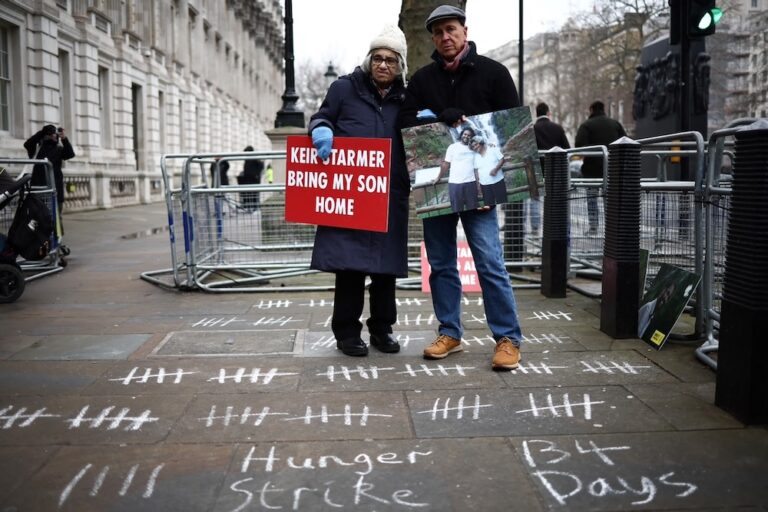On 5 August 1996, Egyptian academic and writer Dr Nasr Hamed Abu-Zeid was ordered to divorce from his wife after being branded an apostate by the Court of Cassation. **Updates IFEX alert dated 20 June 1995** The court ruled that Dr Abu-Zeid was an apostate, confirming a decision by the Cairo Court of Appeals in […]
On 5 August 1996, Egyptian academic and writer Dr Nasr Hamed
Abu-Zeid was ordered to divorce from his wife after being branded
an apostate by the Court of Cassation.
**Updates IFEX alert dated 20 June 1995**
The court ruled that Dr Abu-Zeid was an apostate, confirming a
decision by the Cairo Court of Appeals in June 1995 where the
verdict stated:
“The court announces the separation of the first defendant [Dr
Abu-Zeid] from his wife, the second defendant, because of the
former’s apostasy and because she is a Muslim. And the court
calls on the first defendant to repent to God Almighty and to
return to the Islamic religion which was brought as a light to
the people to being them happiness in this world and the
hereafter.”
Background Information
The charges of apostasy date back to 1993 when Dr
Abu-Zeid, a professor of Arabic Literature at Cairo University,
was denied a promotion after a colleague made accusations against
his writing on the basis that it insulted Islam. The accusations
followed the publication of Dr Abu-Zeid’s book “Criticism of
Religious Discourse”, in which he criticised Islamic investment
companies for which the colleague was acting as a consultant.
The charges related to several of Dr Abu-Zeid’s books and
articles. In “Criticism of Religious Discourse”, he states that
religious texts have to be re-interpreted in their original
historical and social context. He writes, for example, “Since
language develops with the development of society and culture,
providing new ideas and developing its terminology to express
more developed relations, then it is necessary and only natural
to re-interpret texts in their original historical and social
context, replacing them with more contemporary interpretations
that are more humanistic and developed, while keeping the content
of the verses stable.”
In 1993, the Giza Court of Personal Affairs threw the case out,
but the Cairo Court of Appeals overturned this decision in June
1995. Dr Abu-Zeid appealed this decision to the Court of
Cassation who ruled against him on 5 August 1996. This decision
cannot now be appealed.
The ruling comes despite a May 1996 amendment to the Hesba
doctrine which states that only those who have a direct legal
interest in the case may file claims against an individual. The
Hesba doctrine allows people to file suits against those alleged
to have violated religious law. It is argued that the plaintiffs,
Islamic lawyers, had no direct personal interest in the case and
were using it to stifle freedom of expression in Egypt. Dr
Abu-Zeid had himself commented on the dangers of the “apostasy
weapon” in one of his articles, in which he states, “It is a very
effective weapon in a backward reality.” He continues, “What is
notable is that some people give in to this weapon and its
blackmail and make amends with the religious discourse. This is
very dangerous.”
After last year’s ruling, Dr Ibtihal Yunis, Dr Abu-Zeid’s wife,
sent a letter to the Arab Conference in preparation for the
Beijing Conference on Women, in which she called the trial
“rape”. “They have assaulted my humanity and my privacy,” she
states. “What is left after that… the body? What is its
importance after humanity and privacy has been assaulted?”
She continues, “I am a Muslim who is a strong believer in Islam,
and that is why I am the only one who truly knows this man with
whom I am living. I know his faith and loyalty to Islam.”
Dr Yunis says that some of her husband’s accusers have stated
that they are trying to “protect” her. “Did they forget that I am
a sane, adult and mature human being, in addition to being a
university professor who helps build and found tomorrow’s
generations? Or will women remain, in their eyes, mere animals,
of the mammal species, without conscience, mind or understanding,
whose sole role is fulfilling physical needs and breeding?”
Egyptian human rights groups and writers are concerned about the
unprecedented verdict against Dr Abu-Zeid. The Egyptian Human
Rights Organisation (EOHR) called it a “licence to kill” Dr
Abu-Zeid. After last year’s verdict against him, Al Jihad called
for his murder in the belief that Islamic law permits the death
penalty for apostates. Several other writers have been threatened
by Islamic extremists, and in 1992 Dr Farag Fouda was murdered,
reportedly by Jamaat e Islamiya.
Recommended Action
Send appeals to the Egyptian President:
poses such a severe threat to the literary climate in Egypt and
to Egypt’s reputation as a centre for literary excellence
that this case does not set a chilling precedent in Egypt
Appeals To
His Excellency Muhammad Hosni Mubarak
President of the Arab Republic of Egypt
Office of the President
al-Etehadia Building
Heliopolis, Cairo
Egypt
Fax: + 202 260 5417
the Egyptian representative in your country
and to Al-Ahram newspaper (Fax: +202 578 6089)
Please copy appeals to the originator if possible.


